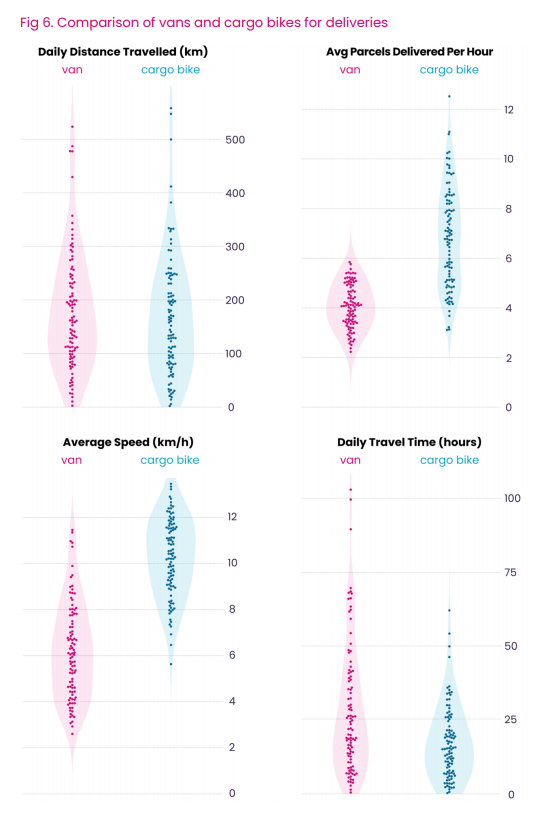Electric cargo bikes provide a cleaner, quicker solution for urban deliveries, but clearer regulations and banning fossil-fuelled vehicles are key to encouraging their uptake. These were conclusions of The Promise of Low-Carbon Freight report, which, using data from logistics operator Pedal Me, found that adopting cargo bikes not only reduced carbon emissions by 90%, compared with diesel vans but also increased urban delivery times by 60%.
The lead author and member of the University of Westminster’s Active Travel Academy, Ersilia Verlighieiri, said to Loadstar: “Our simulation shows bikes offer a greater advantage over vans: Not only considering the time saved in navigating busy and congested roads filled with motorized and polluting traffic, but also the clear advantage of freight deliveries by bicycles in comparison with vans in respect to the speed of service.”
Freight transport contributes significantly and increasingly to climate change. In urban areas, goods vehicles contribute to deteriorating public space quality, air quality, and other road users’ safety. In London alone, between 2015 and 2017, vans and HGVs together were involved in 32% of total fatal collisions. The 213.100 vans owned by Londoners, when parked outside, occupy around 2,5 million sqm of road space, the equivalent of just under twice the size of Hyde Park. The growing demand for online deliveries in B2C and B2B is predicted to worsen the situation, which will not be contained by shifting to less polluting vehicles alone.
Cargo bikes, having become popular in several cities, can provide an alternative to the current damaging freight
transport model, which is increasingly relying on delivery vans. The Pedal Me report provides a study of the logistics potential of cargo bikes for urban deliveries. Using GPS data, they compared routes taken by Pedal Me cargo bikes in London with routes that vans would have to take to deliver the same parcels. The study found that the service performed by the Pedal Me freight cycles is an average of 1,61 times faster than the one performed by van.

According to Pedal Me, these benefits are not just specific to London, with the 100.000 cargo bikes introduced in Europe between 2018-2020 estimated to be saving, each month, the same amount of CO2 needed to fly about 24,000 people from London to New York and back, i.e., 80 Boeing 777-300 flying over 890,000 Km.
Having recognized such potential for the cargo bike sector, there is still much to be done both at a regulatory and provision level to ensure that those options are used at their best potential.
The report concludes with a series of recommendations which in summary are:
- A national Government strategy to support non-motorised freight.
- Deliver on segregated cycle lanes that are wide enough to accommodate this bicycle-based freight.
- Create charges or taxes that discourage unnecessary motor-based logistics, such as fuel duty, road pricing or clean air schemes. Pricing should be favourable to more sustainable freight formats.
- Consider a 0% rating for VAT on cycle logistics.
- Increase the current 250w power output for e-cargo bikes to 1,000w for a motor capable of 15.5mph.
- Regulation to enable cargo bikes to apply for operators licenses to carry people.
- A standardisation of insurance procedures and safety regulations, perhaps via accredited safety training courses.
- Public bodies should lead by example and assess journeys and deliveries of their own that could be taken by cargo bike.
- Provision of adequate parking for such vehicles.
